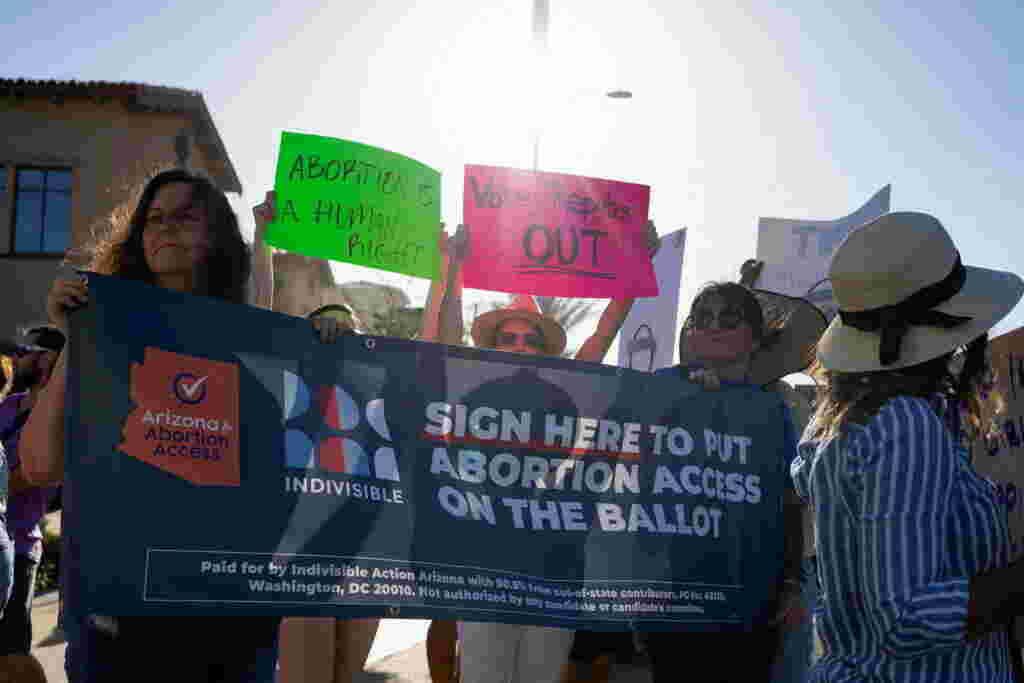Abortion Rights on the Ballot: Voters in Multiple States to Decide
Election officials in Arizona and Missouri have announced that abortion-rights supporters in their states have successfully gathered enough signatures to place proposed constitutional amendments enshrining abortion rights on the ballot this fall. This news adds to the growing list of states where voters will be deciding on abortion measures, bringing the total to more than half a dozen.
These proposals are anticipated to drive high voter turnout, potentially influencing elections for president, Congress, governor, and other state offices. The U.S. Supreme Court's 2022 ruling overturning Roe v. Wade ignited a national movement to allow voters to decide the fate of abortion access.
Since the ruling, a majority of Republican-controlled states have enacted abortion restrictions, including 14 states that now prohibit abortion at all stages of pregnancy. Conversely, most Democratic-led states have passed legislation or issued executive orders to protect abortion access.
Voters in all seven states that have presented abortion questions to voters since 2022 – California, Kansas, Kentucky, Michigan, Montana, Ohio, and Vermont – have sided with abortion rights supporters.
Missouri is set to vote on a constitutional amendment that would guarantee the right to abortion, effectively reversing the state's near-total abortion ban. The measure would establish a right to abortion until a fetus is deemed viable, typically around 23 or 24 weeks into pregnancy. It would also permit abortions after viability if a healthcare professional deems it necessary to protect the pregnant woman's life or physical or mental health.
Arizona voters will decide in November whether to amend their state constitution to include the right to an abortion up to about 24 weeks into pregnancy. The proposed amendment would prevent the state from banning abortion until fetal viability, with later abortions allowed to safeguard a woman's physical or mental health. Opponents of the amendment argue it goes too far and could lead to unrestricted abortions, while supporters maintain it would protect abortion access from political interference.
Colorado, in May, confirmed that a measure to enshrine abortion protections in the state constitution, including requiring Medicaid and private health insurers to cover abortion, will be on the ballot this fall. Supporters collected nearly twice the required signatures for the initiative. A 55% voter approval is needed to amend the state constitution, and abortion is already legal at all stages of pregnancy in Colorado.
Florida, however, currently prohibits abortion after the first six weeks of pregnancy under a law enacted on May 1st.
Maryland voters will also be presented with a question this year to enshrine the right to abortion in the state constitution. Abortion is currently legal in Maryland until viability.
Nevada voters will decide in November whether to enshrine abortion rights in the state constitution. The amendment would protect abortion access for the first 24 weeks of pregnancy, or later to protect the pregnant person's health. Passing the amendment requires approval from voters in both 2024 and 2026. Abortion is already allowed in Nevada until viability.
South Dakota voters will be deciding on a constitutional amendment that would ban any restrictions on abortion in the first trimester. The measure allows the state to regulate abortion decisions in the second trimester only if those regulations are directly related to the pregnant woman's physical health. A ban on abortion would be permitted in the third trimester, with exceptions for the life and health of the woman. Opponents have filed a lawsuit to remove the initiative from the ballot.
New York voters will consider a reproductive rights measure, not explicitly focused on abortion, which would prohibit discrimination based on "pregnancy outcomes" and "reproductive healthcare" along with other protected categories. Abortion is currently legal in New York until fetal viability.
Montana abortion rights proponents have put forward a constitutional amendment to prohibit the government from denying the right to abortion before viability or when it is necessary to protect the pregnant person's life or health. The Montana Supreme Court has finalized the ballot language for this measure, pending validation of a sufficient number of signatures.
Ohio voters will face two competing abortion measures in November, with both sides having submitted more than the required signatures for ballot access. One measure would enshrine the right to abortion until viability in the state constitution, while the other would codify the current law, which prohibits abortions after the first 12 weeks of pregnancy, with some exceptions. The measure receiving the most votes will become part of the state constitution.
Arizona and Missouri are the latest states to add abortion amendments to the ballot. What would the measures do?
Voters in more than a half-dozen states will be deciding abortion measures this fall. The proposals are likely to drive up voter turnout, potentially affecting elections for president, Congress, governor and other state offices.


